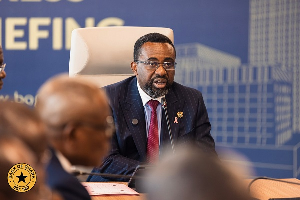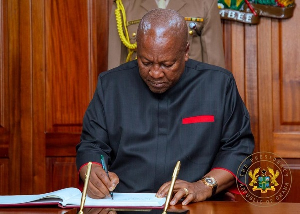Ghana’s programme with the International Monetary Fund (IMF) was concluded on March 20, 2019. It brought to fruition a 4-year Extended Credit Facility (ECF) aimed at helping the country reduce its then large fiscal and current account deficits. The programme has been successful in this respect as it has helped to restore macroeconomic stability. Though important vulnerabilities remain which underline the urgency of maintaining a prudent macro-policy stance. Ghana will now go back to regular surveillance, or “health checks”, as envisaged by the Article IV of the IMF’s Articles of Agreement and will continue to receive technical assistance from the Fund.
The December visit to Ghana of Madam Christine Lagarde—the first by an IMF Managing Director in almost two decades—shed light on the ultimate goal of the Fund’s work in member countries. That is, to improve living standards for all. Nowhere more than during Madam Lagarde’s call on a group of kayeyei at the Agbogbloshie market, the urgency to improve living conditions could be felt. Macroeconomic stability is a stepping stone to better living standards. Certainly, Ghana has come a long way in this respect.
The request for a Fund bailout came at the eleventh hour
When Ghana officially requested the Fund support on August 8, 2014, the cedi had depreciated by 40 per cent, inflation was in the double-digits, and the Bank of Ghana only had around seven days’ worth of imports in net foreign exchange reserves, equivalent to US$400 million. In the first half of 2014, the fiscal deficit was almost exclusively financed by BoG printing money for an amount equivalent to 22 per cent of the previous year’s fiscal revenue, compared with a target of only 5 per cent, as alternative financing sources were drying up fast. Interest rates stood at around 24–25 per cent on domestic debt.
The programme created breathing space to tackle critical issues
The generous terms of the Fund financing provided Ghana with the needed breathing space to avoid resorting to measures that are harmful to national prosperity. For instance, the Government was able under the programme not to accrue new arrears while at the same time adopting a clearance plan to deal with legacy arrears. This IMF loan carries a zero-interest rate, with a 5½ years moratorium, and a final maturity of 10 years. By comparison, Ghana issued a $1 billion Eurobond on September 11, 2014, at a coupon rate of 8.125 per cent for a 12-year maturity.
Of course, some measures—such as the freeze on public sector wages, were less accommodative. This is sometimes the reality of putting an economy on a strong footing. The people of Ghana need to be commended for these sacrifices, and the Government and Bank of Ghana for their resolve to tackle difficult reforms.
More broadly, the programme has been a useful platform: (i) to anchor fiscal discipline, with fiscal primary surpluses achieved in 2017 and 2018; (ii) to improve control over public spending, with the adoption of the Public Financial Management Act in August 2016; (iii) to reduce inflation to a single digit, with a halt on fiscal dominance; (iv) to reduce the interest bill, with the lengthening of the maturity of public debt and its reprofiling; (v) to strengthen the banking sector, with the identification and clean-up of weak institutions; and (vi) to build external buffers up, with the accumulation of foreign exchange reserves.
Though, important challenges remain at the end of the programme
Despite the overall success of the programme, challenges remain that require continued efforts. For instance, stronger revenue mobilisation would go a long way in reducing large financing needs of the country and lowering the risk of debt distress. In this respect, the submission of the tax exemption bill to Parliament is a step in the right direction. However, improved tax compliance cannot be overstated in this case. Technology offers promising avenues in this respect.
Of equal importance is the need to get a grip on off-budget spending to avoid making fiscal policy more expansionary than it should be. Otherwise, it would weaken the fundamentals of the economy, put undue pressure on the cedi and contribute to the erosion of foreign exchange reserves—though, the foreign exchange market could be more efficient. Certainly, the planned infrastructure projects have a positive bearing on medium-term economic growth, though they should be consistent with debt sustainability and ensure value for money. The Fund will continue to assist Ghana in addressing these challenges.
In addition, the energy sector remains a substantial drain on public finances. In fact, continued losses stemming from high-cost of fuel and power bought from independent power producers, operational inefficiencies, low revenue collections, and non-payment practices among public sector entities have all contributed these fiscal risks. But there are promising actions in train to improve the sector’s financial viability, including with the World Bank’s assistance.
Regular “health checks” is the norm for every IMF member country
After the end of Ghana’s programme, the relationship with the IMF will now shift to surveillance centered on the Article IV consultations—the universal type of engagement of the Fund with member countries. The consultations are known as “Article IV consultations” because they are required by Article IV, section 3 (b) of the IMF's Articles of Agreement. During an Article IV consultation, an IMF team of economists visits a country to assess economic and financial developments and discuss the country's economic and financial policies with Government and central bank officials. IMF staff missions also often meet with parliamentarians and representatives of business, labour unions, and civil society.
In the case of Ghana, Article IV consultations will be complemented by Post-Programme Monitoring (PPM) consultations. This is a unilateral process put in place by the Fund as a fiduciary guardian of the donor resources lent to Ghana under the Poverty Reduction and Growth Trust. It is automatically activated when the fund owed to the IMF exceeds a certain amount. For countries like Ghana, it must exceed US$525 million—Ghana had US$1.17 billion outstanding at end-April 2019.
The IMF will also remain engaged in Ghana through capacity development, which is another core function together with surveillance and lending. Capacity development accounts for about a third of the Fund resources. Its main objective is to help member countries strengthen Government institutions and capacity necessary to formulate and implement sound economic and financial policies. It also helps countries to make progress towards the Sustainable Development Goals (SDGs). Some of the Fund’s capacity development support in Ghana is delivered by its Regional Technical Assistance Center based in Accra (AFRITAC West 2). Currently, AFRITAC West 2 provides technical assistance in Revenue Administration and Taxation, Public Financial Management, Macroeconomic Statistics, Monetary Operations and Payments System, and Banking Supervision.
Continued prudent macroeconomic policies are necessary
Going forward, the medium-term prospects for the Ghanaian economy remain supportive, especially as infrastructure and oil and gas investments proceed as planned. A favorable external environment would help support these prospects. Also, the newly-ratified Continental Free Trade Area (CFTA) has the potential to be a “game changer”, and not just for Ghana. From a policy point of view, the commitment from both the Government and Bank of Ghana to maintain prudent fiscal policy and monetary policy stances is paramount. The recent adoption of key regulations signals such commitment.
Specifically, the Financial Stability and the Fiscal Responsibility Advisory Councils and the Fiscal Reasonability Law—which caps the deficit at 5 percent and requires a primary surplus—would provide a framework to monitor policy implementation. It empowers the people of Ghana and other stakeholders, including the Fund, to hold the policy-makers accountable. They add to other key components such as the zero financing of Government by Bank of Ghana since 2015, the Public Financial Management Act, and the more recent Social Partnership Agreement with Organised Labour. By all accounts, Ghana has never been better equipped to prevent slippages going into an election year.
As Madam Lagarde stated during her visit: «if there is that resolve to stay the course and to maintain [fiscal] discipline, Ghana has everything it takes to do without an IMF programme.
Opinions of Wednesday, 22 May 2019
Columnist: Dr. Albert Touna-Mama















